Razorfish, Google Unveil AI-Powered Reputation Index 06/18/2024
Razorfish and Google are forming a partnership to launch AI predictive algorithms for advanced measurement such as scoring brand performance and monitoring consumer sentiment. R-Index (with the "R" representing "reputation”), announced at 2024 Cannes Lions Festival of Creativity, draws from a variety of data sources that historically have not been available -- including paid media, macroeconomic, competitive data and others -- to do advanced modeling.

“The consumer audience is quite fragmented and different audiences interact differently,” says Sisi Zhang, chief data and analytics officer at Razorfish. “The collaboration with Google provides AI-enablement in future releases.”
Several Razorfish clients including New York Life have piloted the custom algorithm. During the past four years, New York Life has significantly grown its consumer leads program, with a nearly 50% increase in lead volume while driving costs down by as much as 39%.
“The acceleration of data-privacy regulation and the growing need for simplified and streamlined data and measurement solutions prompted the creation of R-Index. Disparate data and measurement options face challenges in terms of providing a complete view of performance. The R-Index will help marketers overcome these challenges.”
R-Index Development and Features
R-Index is in its Alpha stage, but is scheduled for a broader release later this year. It was built in Google Cloud, and there is a visualization layer within it that brands can use. Razorfish developers at the Publicis Groupe agency used Google Cloud BigQuery, Looker Studio, Sensitive Data Protection, and its suite of AI and machine-learning capabilities, including both sets of tools within Google AI systems.

One is Gemini, and the other is Vertex AI. Both provide a dynamic and nuanced view into a brand's overall marketing investment performance. An adaptable and predictive custom algorithm aims to optimize different models. In the future, Razorfish will add additional data connections, and will help with unstructured data.
“Using the AI layer helps to understand creative assets and the types of insights that drive performance,” said Zhang. She said companies can use R-Index in several ways such as optimizing media investments. She said it is intended to be "a beacon metric, with the ability to deep dive into areas such as performance, consumer sentiment, and conversion.” Optimization could be related to actions and taking a look at the overall media mix.

Subscribe today to gain access to every Research Intelligencer article we publish as well as the exclusive daily newsletter, full access to The MediaPost Cases, first-look research and daily insights from Joe Mandese, Editor in Chief. If you're already a paid subscriber, please sign in.




















